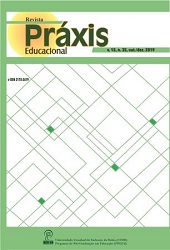DIDACTIC PROJECTS: A TRAINING CONCEPTION AND APPROPRIATION OF THE WORLD
DOI:
https://doi.org/10.22481/praxisedu.v15i35.5672Keywords:
Didactic Projects, Knowledge Production, DidacticsAbstract
The article proposes a discussion about education from Didact Projects, whose purpose is the formation of people capable to produce knowledge in an informational world progressively more complex and provisional, in view of the advances in information and computing technologies. Initially, it emphasizes that the realization of Didactic Projects implies a deep change in the concept of school education and in the way the knowledge production in school is understood. It argues that in the Didactic Projects it is not only the content in question that forms the subjects involved, but the way they get to know them. From this, concept it proposes the school as a place of learning that conceives the act of knowing as a collective work in the experience of the subjects in relation to the world and the accumulated knowledge. It also emphasizes that problematization is a fundamental aspect because what it is at stake in Didactic Projects is the possibility to build the habit to propose problems and to find their solutions as a way of learning. It highlights the relevance of evaluation in the execution of Didact Projects and discusses the use of work schedules as an instrument to learn how to take decisions and monitor the process of learning itself. Finally, it argues in favor of knowledge as a collective production and education as a public education whose principal aim is to train people.
Downloads
Metrics
Downloads
Published
How to Cite
Issue
Section
License
You are free to:
Share - copy and redistribute the material in any medium or format; Adapt - remix, transform, and build from the material for any purpose, even commercially. This license is acceptable for Free Cultural Works. The licensor cannot revoke these freedoms as long as you follow the terms of the license.
Under the following terms:
Attribution - You must appropriately give credit, provide a link to the license, and indicate if any changes have been made. You may do so in any reasonable way, but not in a way that suggests that you or your use is endorsed by the licensor.
There are no additional restrictions - You cannot apply legal terms or technological measures that legally restrict others to make any use permitted by the license.










